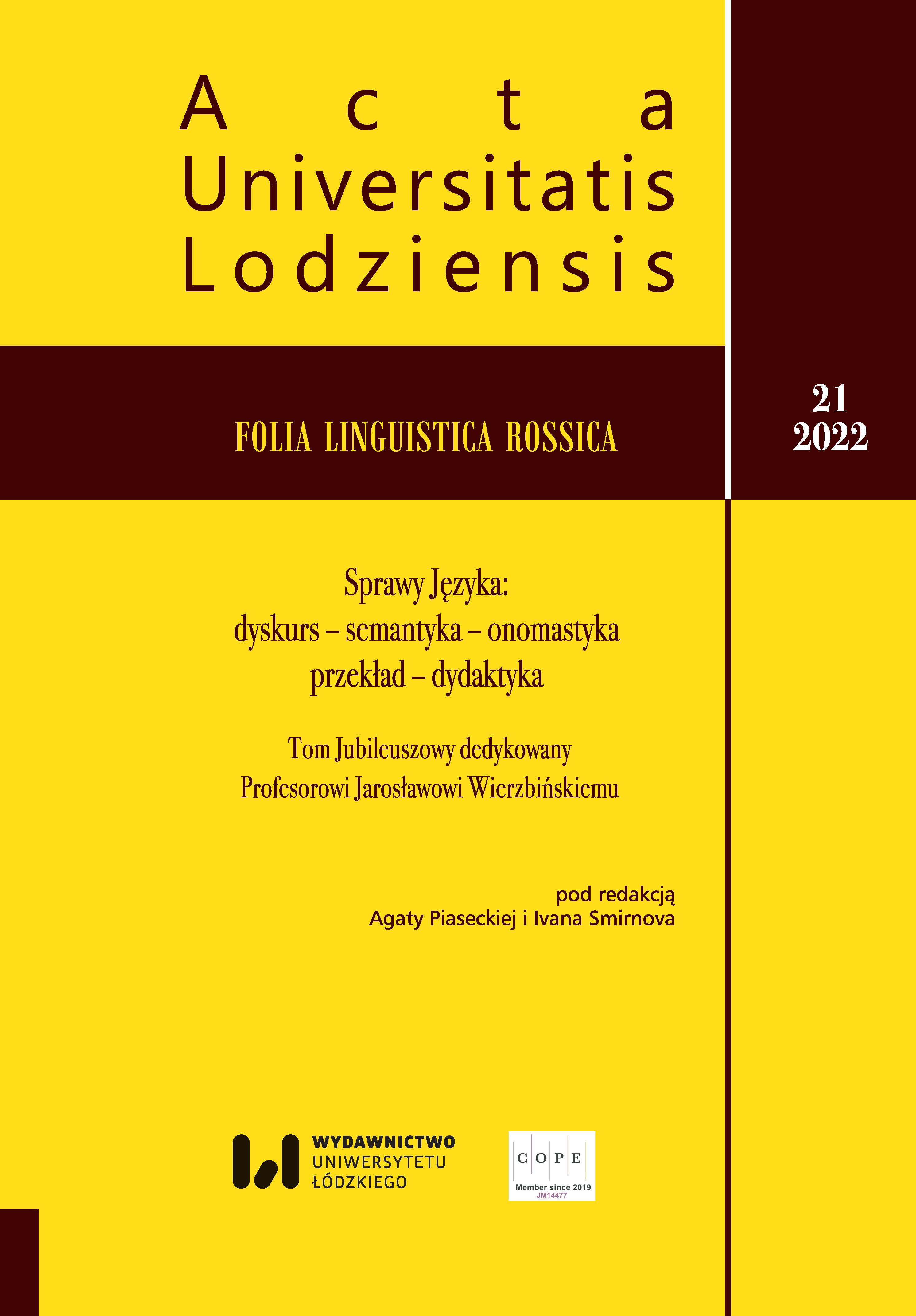Participles in the "Didactic Gospel" of Meletij Smotryc’kyj
DOI:
https://doi.org/10.18778/1731-8025.21.03Keywords:
Meletij Smotryc’kyj, Didactic Gospel, Ostrog Bible, Kuliš, Synodal translation, translation techniqueAbstract
In the course of his missionary activities, in his Didactic Gospel (Evanhelije Učytel’noe = UE), Meletij Smotryc’kyj aimed to present Biblical texts and their commentaries in a more vernacular, not so much Church Slavonic language in order that readers could more easily become familiar with the views of Orthodox authors. Based on the material of the first ten Biblical readings in the order of UE, the article identifies all participle constructions in the Greek source text and compares them with their translation equivalents in different Bible translations: UE, Ostrog Bible, Ukrainian Bible translation of Kulyš, and Russian Synodal translation.
The article poses the question of whether it is possible to make conclusions about the closeness of each translation towards a more vernacular way of speaking by showing a numerical comparison of all instances, when the translations are in full morphological equivalence with the Greek source. Considering not only morphological equivalence with the Greek construction but adding grammatical tense of the participle as a second parameter for comparison, then the translations will differ more significantly. Change of tense, of course, is inevitable if the target language does not exhibit an equivalent for aorist, but still, it is a question if the translation of an aorist participle results in a preterit participle (mostly aspectually perfective) or in a present participle (aspectually imperfective).
The article is not concerned with linguistic problems of verbal aspect in different Slavic languages but seeks to find out which conclusions about the translation technique could be drawn from comparing numerical correspondences in the realm of morphological equivalence. The material shows that the numerical comparison of instances of morphological adequacy in different Slavic translations permits conclusions about the literal character of the translation but does not allow the stylistic characteristics to be judged.
References
Коницкая, Е. (2019). Международная научная конференция: Грамматика Мелетия Смотрицкого в лингвистическом контексте Европы XVI–XVIII вв. Вильнюс 29 сентября – 2 октября 2019. г., Slavistica Vilnensis, 64 (2), 155–162.
Google Scholar
Турконяк, Р. (2006). Острозька Біблія. Львів: Книга.
Google Scholar
Aland, B., Aland, K. et al. (2012). Testamentum Graece. Stuttgart: Deutsche Bibelgesellschaft.
Google Scholar
Daiber, Th. (1992). Die Darstellung des Zeitworts in ostslavischen Grammatiken von den Anfängen bis zum ausgehenden 18. Jahrhundert, Freiburg i. Br. Freiburg i Br.: U.W. Weiher.
Google Scholar
Daiber, Th. (2013). Wisset! Zu einem angeblichen Anakoluth in Mk 2,10 bzw. zum ὅτι recitativum, Zeitschrift für die Neutestamentliche Wissenschaft und die Kunde der Älteren Kirche, 104 (2), 277–285.
Google Scholar
Daiber, Th. (2014). Slavische Grammatikschreibung. In: Die slavischen Sprachen. Ein internationals Handbuch zu ihrer Struktur, ihrer Geshichte und ihrer Erforschung. Band 2 (1793–1811), Gutschmidt, K., Kempgen, S., Berger, Tilman, K. (ed.). Berlin: De Gruyter.
Google Scholar
Daiber, Th. (2019). Schriftlichkeitsdiglossie, Bibelsprache und Emblematik, Linguistische Beiträge zur Slavistik, XXV. JungslavistInnen-Treffen Göttingen, Böhnisch, G., Junghanns, U., Pitsch, H. (ed.). Berlin, Bern, Bruxelles: Lang, 71–91.
Google Scholar
Frick, D.A. (1987). The Jevanhelije učytelnoje of Meletij Smotryc’kyj. Harvard: Harvard University Press.
Google Scholar
Karvounis, Ch. (2016). Diglossie, Sprachideologie, Wertekonflikte: Zur Geschichte der neugriechischen Standardsprache (1780 bis 1930). Köln: Böhlau.
Google Scholar
Strumyns’kyj, B. (1980). The Influence of Populists on Ukrainian Grammar: The Plight of Active-Present Adjectival Participles in Ukrainian, Journal of Ukrainian Studies, 5 (1), 3–14.
Google Scholar
Weber, R., Gryson, R. (1994). Biblia sacra iuxta vulgatam versionem. Stuttgart: Deutsche Bibelgesellschaft.
Google Scholar
Aland, B., Aland, K. et al. (2012). Testamentum Graece. Stuttgart: Deutsche Bibelgesellschaft.
Google Scholar
Daiber, Th. (1992). Die Darstellung des Zeitworts in ostslavischen Grammatiken von den Anfängen bis zum ausgehenden 18. Jahrhundert, Freiburg i. Br. Freiburg i Br.: U.W. Weiher.
Google Scholar
Daiber, Th. (2013). Wisset! Zu einem angeblichen Anakoluth in Mk 2,10 bzw. zum ὅτι recitativum, Zeitschrift für die Neutestamentliche Wissenschaft und die Kunde der Älteren Kirche, 104 (2), 277–285, https://doi.org/10.1515/znw-2013-0015.
Google Scholar
DOI: https://doi.org/10.1515/znw-2013-0015
Daiber, Th. (2014). Slavische Grammatikschreibung. In: Die slavischen Sprachen. Ein internationals Handbuch zu ihrer Struktur, ihrer Geshichte und ihrer Erforschung. Band 2 (1793–1811), Gutschmidt, K., Kempgen, S., Berger, Tilman, K. (ed.). Berlin: De Gruyter.
Google Scholar
Daiber, Th. (2019). Schriftlichkeitsdiglossie, Bibelsprache und Emblematik, Linguistische Beiträge zur Slavistik, XXV. JungslavistInnen-Treffen Göttingen, Böhnisch, G., Junghanns, U., Pitsch, H. (ed.). Berlin, Bern, Bruxelles: Lang, 71–91.
Google Scholar
Frick, D.A. (1987). The Jevanhelije učytelnoje of Meletij Smotryc’kyj. Harvard: Harvard University Press.
Google Scholar
Karvounis, Ch. (2016). Diglossie, Sprachideologie, Wertekonflikte: Zur Geschichte der neugriechischen Standardsprache (1780 bis 1930). Köln: Böhlau, https://doi.org/10.7788/9783412504984
Google Scholar
DOI: https://doi.org/10.7788/9783412504984
Konitskaya, E. (2019). Mezhdunarodnaya nauchnaya konferentsiya: Grammatika Meletiya Smotritskogo v lingvisticheskom kontekste Evropy XVI–XVIII vv. Vil’nyus 29 sentyabrya – 2 oktyabrya 2019. g., Slavistica Vilnensis, 64 (2), 155–162.
Google Scholar
DOI: https://doi.org/10.15388/SlavViln.2019.64(2).30
Strumyns’kyj, B. (1980). The Influence of Populists on Ukrainian Grammar: The Plight of Active-Present Adjectival Participles in Ukrainian, Journal of Ukrainian Studies, 5 (1), 3–14.
Google Scholar
Turkonyak, R. (2006). Ostroz’ka Bіblіya. L’vіv: Kniga.
Google Scholar
Weber, R., Gryson, R. (1994). Biblia sacra iuxta vulgatam versionem. Stuttgart: Deutsche Bibelgesellschaft.
Google Scholar
Downloads
Published
How to Cite
Issue
Section
License

This work is licensed under a Creative Commons Attribution-NonCommercial-NoDerivatives 4.0 International License.









